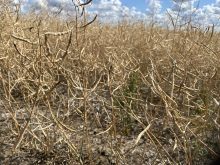Jones writes from Fairview, Alta.
I read with dismay, “Meat study draws mixed response,” (WP April 2) particularly since I had just finished reading Good Calories-Bad Calories by Gary Taubes.
The U.S. Cancer Institute has, along with other U.S. cancer, heart, diabetes and cholesterol groups, cherry picked research for more than 70 years in order to reinforce Ancel Keys flawed lipid hypothesis, published in 1950, and their own agendas.
Gary Taubes is a correspondent with Science magazine and has impeccable credentials as an investigative journalist.
Read Also

Producers face the reality of shifting grain price expectations
Significant price shifts have occurred in various grains as compared to what was expected at the beginning of the calendar year. Crop insurance prices can be used as a base for the changes.
His analysis of more than 2,000 published papers and 600 personal interviews covers the whole topic of degenerative diseases and should have been required reading for the authors of this flawed meat report.
After more than 450 pages of stories about the harm caused by researchers, doctors and interest groups, Taubes sums up his findings in 10 statements.
The first four bear repeating.
1. Dietary fat, saturated or not, is not the cause of obesity, heart disease or any other chronic disease of civilization.
2. The problem is carbohydrates in the diet, their effect on insulin secretion and thus the hormonal homeostasis of the human body. The more easily digestible and refined the carbohydrates, the greater the effect on our health, weight and well being.
3. Sugars, sucrose and high fructose corn syrup are particularly harmful, probably because the combination of fructose and glucose elevates insulin levels while overloading the liver with carbohydrates.
4. Through their direct effect on insulin and blood sugar, refined carbohydrates, starches and sugars are the dietary cause of coronary heart disease and diabetes.
After reading the story on the meat study, I can only offer these researchers the cautious advice that would likely be offered by profs like C. M. “Red” Williams: “Get rid of the variables and don’t try to make your research prove your preconceived notions.”





![Protesters crowd a street carrying signs that read, "Global warming real. In other news, water is wet," and "Stop denying the [blue painted pic of the Earth] is dying."](https://static.producer.com/wp-content/uploads/2025/07/29145152/158171_web1_2019-10-18T222818Z_1221762151_RC14C26A65A0_RTRMADP_3_CLIMATE-CHANGE-THUNBERG-1200-220x165.jpg)









